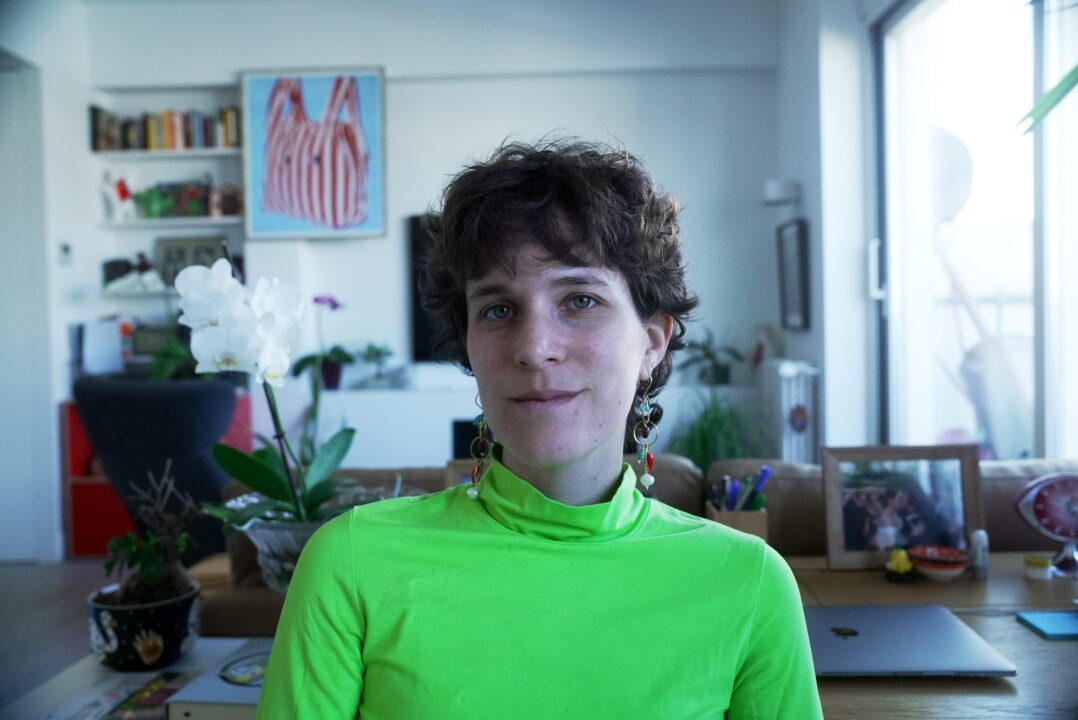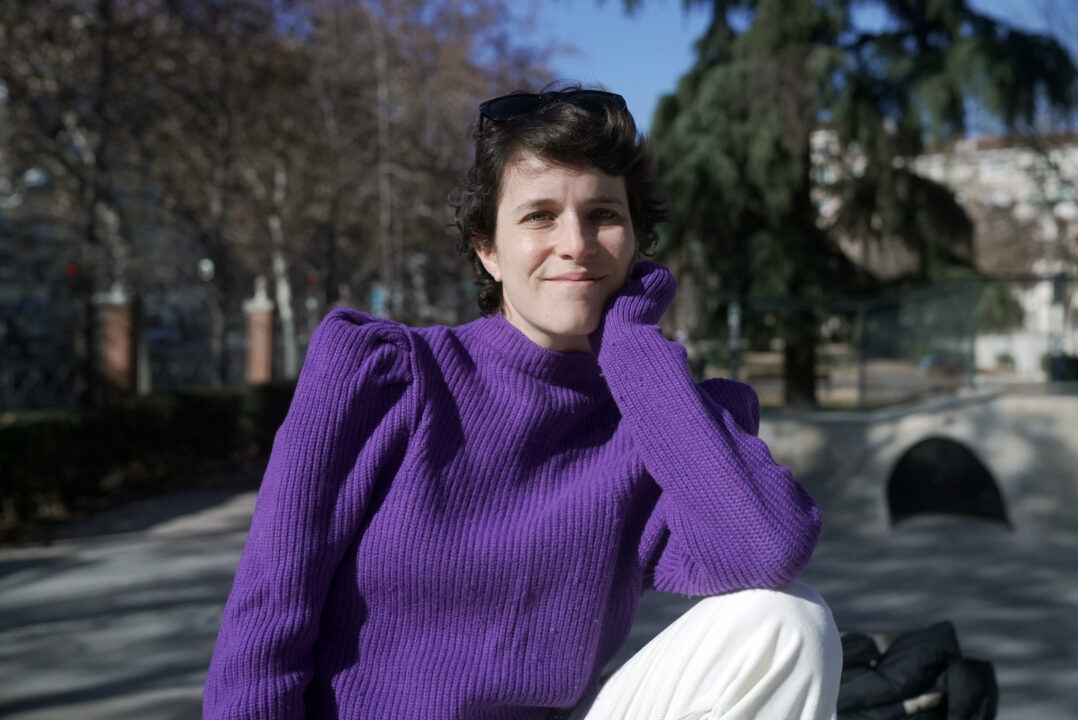Not many directors would weave reality and fiction together in their feature debut, let alone do so by exploring deeply personal secrets through a “docu-fiction” lens. But Carolina Perelman did just that with Confesiones Chin Chin. The film, which will have its world premiere at the 2025 Slamdance Film Festival, delves into the blurred lines between truth and persona, capturing the raw, unfiltered nature of human emotion and vulnerability.
In our exclusive interview, Perelman shares the inspiration behind the film’s unique approach, how jazz shaped its chaotic energy, and the balance between humor and serious topics like trauma and fidelity. What does she hope audiences take away? A reminder that honesty can bring freedom and connection, allowing us to embrace our truths without shame.
Cinemacy: It’s a pleasure to meet you, Carolina! You describe your feature film, Confesiones Chin Chin, as a “docu-fiction” that draws from real secrets and confessions. Where did the idea to intertwine the line between reality and fiction come from, and how did you balance these elements during the writing and filming process?
Carolina Perelman: It’s a pleasure to meet you too! The idea of intertwining reality and fiction in Confesiones Chin Chin emerged from a fascination with how these elements already blur our everyday lives. It’s impossible to reveal the rawest truth because sometimes we don’t even know it. I think deeply personal or uncomfortable questions, especially about society’s morality, values, family, and friends, often force us to pretend who we are. That’s why… by the way, I love “Be Yourself” by Frank Ocean because he says, “Be yourself and know that that’s good enough.” It’s difficult to understand that, and that is why I wanted to explore that tension, that line between reality and fiction in this film.
My main inspiration for this film was Jason Holliday in Shirley Clarke’s film, Portrait of Jason, where the lines between the character—Jason Holliday—and the person blur as layers of a persona are peeled back. We similarly embraced the absurdity of our nature while probing the question: where does the character end, and the person begin? And that is pure jazz!!!
To balance reality and fiction in both the writing and shooting process, I began by interviewing cast members and collecting secrets and confessions from people I knew, using these as inspiration to ground the narrative in authenticity. I also involved non-actors by creating spontaneous situations before filming and giving them complete freedom to speak and act as they wished. The writing process unfolded alongside the research and before, allowing us to craft dialogues that resonated with the themes and realities we explored. On shooting days, I introduced an element of surprise by giving actors small notes with opposing secrets before certain scenes.
Cinemacy: The film features a diverse ensemble of characters. How did you go about casting the actors, and did any of them share personal confessions or stories that directly influenced their performances?
Carolina Perelman: It’s difficult to pinpoint an elaborate answer because the process was simple: I chose actors who shared a meaningful connection with some aspect of the project or that I genuinely really like because I think they are either fun or creative.
Some cast members contributed personal experiences that influenced their performances, while secrets and confessions guided others I had collected from other people during my research. Of course, these stories were shared anonymously to respect the privacy and identity of the participants, ensuring a safe and respectful creative process.

Cinemacy: Jazz plays a crucial role in the film, not just as a soundtrack but as a thematic device. How did you collaborate with the composer or sound team to ensure that the music captured the frenetic, free-form energy of the characters’ emotions?
Carolina Perelman: Jazz was essential in shaping the film’s atmosphere, and, OF COURSE, Charlie Parker and Miles Davis were our core inspirations. The conversations in the film don’t have clear beginnings or endings, which, in my opinion, is characteristic of the nightlife in Madrid and jazz.
It’s like having a deep conversation with a random person in a bar—you may not remember how it started or how it ended, but it resonates with a kind of chaotic harmony. When I read Julio Cortázar’s short story “El Perseguidor,” I remember feeling intense energy and adrenaline, as Parker’s jazz also inspired him. I wanted to capture that same sensation in the ambiance of Cazador bar…or something similar to that energy.
Cinemacy: Given that the film explores both the absurdity and the pain of human relationships, how did you approach the tone? Was it challenging to find the right balance between humor and the more serious moments of the story?
Carolina Perelman: Not at all. I think it was like opening and closing drawers. In real life, you can cry and end up laughing. The same thing happened in Confesiones Chin Chin.
Cinemacy: The “chin chin” toast symbolizes relief and unburdening. How did you use this concept symbolically throughout the film, visually and narratively, to underline the theme of confession and honesty?
Carolina Perelman: “Chin Chin” is like saying “cheers.” Without planning, I realized that “chin chin” is like breathing out when you get something off your chest—something you really wanted to say but were too embarrassed or scared to, fearing it might hurt someone. Then you finally say it and exhale. In the film, we’re in a bar, so instead of feeling like a yoga class, we celebrate people’s flaws and virtues, because no one is perfect or an angel.
That’s why I wanted to start closing the film and the chaos with archival materials of some cast members as kids, to remind ourselves where we come from—a genuine and innocent place, the “unburdened place.”
Cinemacy: You mention using humor to address complex topics like sexuality, abuse, and fidelity. Can you speak more about how you approached writing and directed those scenes to maintain respect while allowing for moments of levity?
Carolina Perelman: I approached people’s secrets and confessions with deep respect, ensuring their essence was preserved. Meaning that if the person who confessed to me something with humor, I wanted to respect that. For instance, Roberto’s confession about being abused in a hotel in Peru was inspired by the real person’s ability to weave humor into their vulnerability.
Also, in my personal experience, the best way to cope with trauma is with a little bit of humor. Why is humor disrespectful? I think it is the best way to break the ice and allow people to share. But that is my opinion relying on the research I did.

Cinemacy: You’ve spoken about the idea of “self-conscious behavior” in the film. What direction did you give the cast to encourage them to embody this self-awareness, especially since many characters reveal deeply personal, often uncomfortable truths?
Carolina Perelman: The less information I gave them, the better because it allowed for a rawness to emerge—the nakedness of the soul. I had the opportunity to have long conversations and interviews with some of them for 3-4 months. I think it was enough information, and during the shoot, I wanted the actors to shed their defenses and preconceived notions about their characters.
I didn’t want to rehearse or give any direction, just a preamble or a little secret to some of them before each scene… Often, I withheld key details until the moment of filming, so their reactions carried a genuine immediacy. This demanded immense trust, but it allowed them to embody vulnerability in its truest form, where the deeply personal and uncomfortable could surface authentically.
Cinemacy: What is the most important thing you learned after making this film?
Carolina Perelman: The most important thing I learned is that instinct—that thing you sometimes don’t fully understand but drives you to create art or take action—is what you have to follow when making a film or any kind of art. Listen and observe what’s around you…and most importantly, listen to yourself.
Cinemacy: What do you hope audiences take away from the film?
Carolina Perelman: Nothing in particular, but perhaps a little less alone and embarrassed when they think about their dark secrets (if they have any). And toast to the freedom found in honesty! Fuck it, we are gonna die one day…might as well say and do what we want when we feel like it.
Cinemacy: What advice would you give fellow filmmakers who want to make their first feature film or break into the industry?
Carolina Perelman: Do it no matter what! Don’t be preoccupied with having the best camera, which is very expensive! Try to create genuine and honest art… be organized and efficient, and try to have fun! Try to avoid taking things personally. Just know it’s challenging to manage people’s egos. Breathe and find the patience inside you.
For more, visit https://produccionesnau.com/

